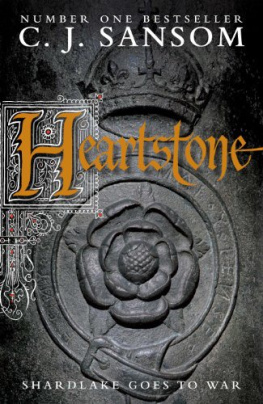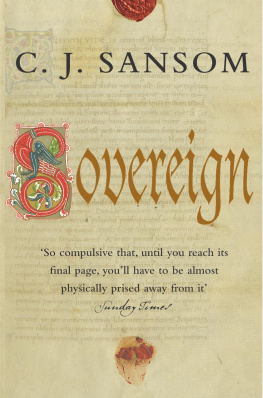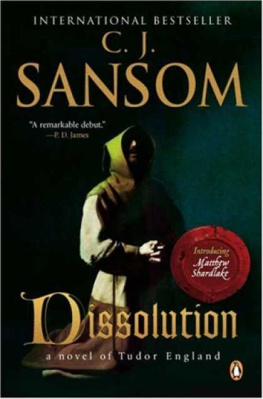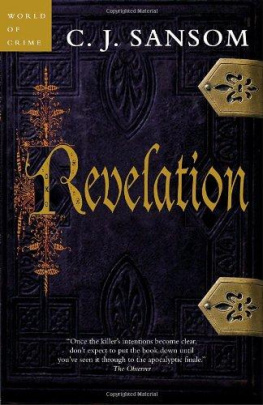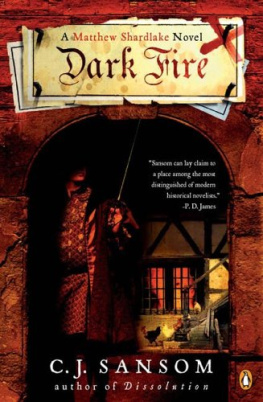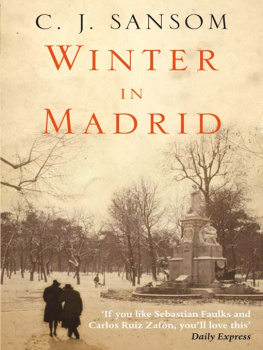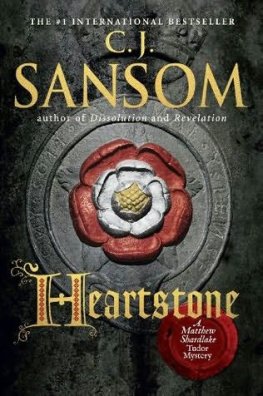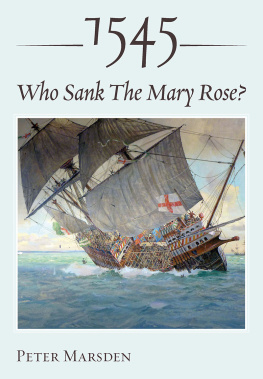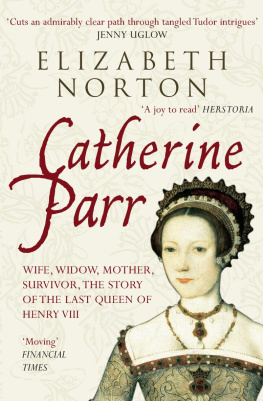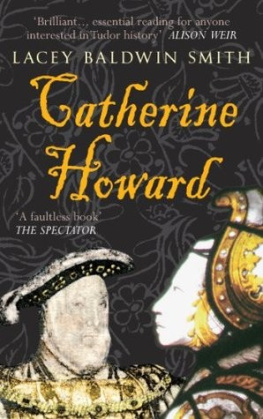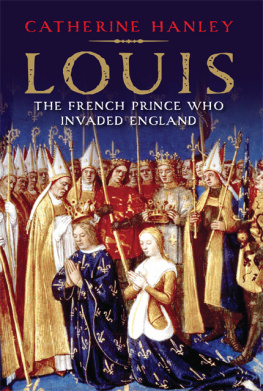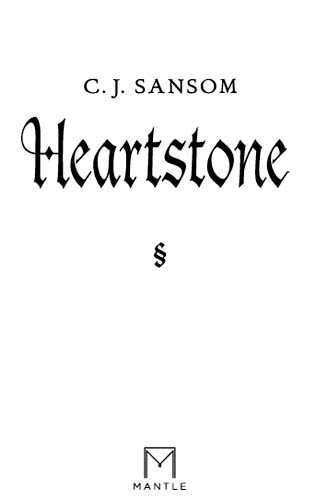
C ONTENTS
Part One
LONDON
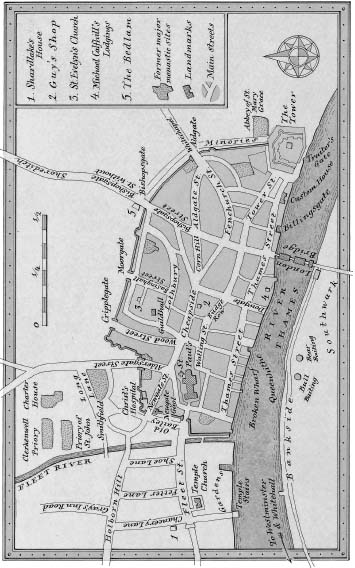
Chapter One
T HE CHURCHYARD was peaceful in the summer afternoon. Twigs and branches lay strewn across the gravel path, torn from the trees by the gales which had swept the country in that stormy June of 1545. In London we had escaped lightly, only a few chimneypots gone, but the winds had wreaked havoc in the north. People spoke of hailstones there as large as fists, with the shapes of faces on them. But tales become more dramatic as they spread, as any lawyer knows.
I had been in my chambers in Lincoln's Inn all morning, working through some new briefs for cases in the Court of Requests. They would not be heard until the autumn now; the Trinity law term had ended early by order of the King, in view of the threat of invasion.
In recent months I had found myself becoming restless with my paperwork. With a few exceptions the same cases came up again and again in Requests: landlords wanting to turn tenant farmers off their lands to pasture sheep for the profitable wool trade, or for the same reason trying to appropriate the village commons on which the poor depended. Worthy cases, but always the same. And as I worked, my eyes kept drifting to the letter delivered by a messenger from Hampton Court. It lay on the corner of my desk, a white rectangle with a lump of red sealing wax glinting in the centre. The letter worried me, all the more for its lack of detail. Eventually, unable to keep my thoughts from wandering, I decided to go for a walk.
When I left chambers I saw a flower seller, a young woman, had got past the Lincoln's Inn gatekeeper. She stood in a corner of Gatehouse Court, in a grey dress with a dirty apron, her face framed by a white coif, holding out posies to the passing barristers. As I went by she called out that she was a widow, her husband dead in the war. I saw she had wallflowers in her basket; they reminded me I had not visited my poor housekeeper's grave for nearly a month, for wallflowers had been Joan's favourite. I asked for a bunch, and she held them out to me with a work-roughened hand. I passed her a halfpenny; she curtsied and thanked me graciously, though her eyes were cold. I walked on, under the Great Gate and up newly paved Chancery Lane to the little church at the top.
As I walked I chided myself for my discontent, reminding myself that many of my colleagues envied my position as counsel at the Court of Requests, and that I also had the occasional lucrative case put my way by the Queen's solicitor. But, as the many thoughtful and worried faces I passed in the street reminded me, the times were enough to make any man's mind unquiet. They said the French had gathered thirty thousand men in their Channel ports, ready to invade England in a great fleet of warships, some even with stables on board for horses. No one knew where they might land, and throughout the country men were being mustered and sent to defend the coasts. Every vessel in the King's fleet had put to sea, and large merchant ships were being impounded and made ready for war. The King had levied unprecedented taxes to pay for his invasion of France the previous year. It had been a complete failure and since last winter an English army had been besieged in Boulogne. And now the war might be coming to us.
I passed into the churchyard. However much one lacks piety, the atmosphere in a graveyard encourages quiet reflection. I knelt and laid the flowers on Joan's grave. She had run my little household near twenty years; when she first came to me she had been a widow of forty and I a callow, recently qualified barrister. A widow with no family, she had devoted her life to looking after my needs; quiet, efficient, kindly. She had caught influenza in the spring and been dead in a week. I missed her deeply, all the more because I realized how all these years I had taken her devoted care for granted. The contrast with the wretch I now had for a steward was bitter.
I stood up with a sigh, my knees cracking. Visiting the grave had quieted me, but stirred those melancholy humours to which I was naturally prey. I walked on among the headstones, for there were others I had known who lay buried here. I paused before a fine marble stone:
R OGER E LLIARD
B ARRISTER OF L INCOLN'S I NN
B ELOVED HUSBAND AND FATHER
1502-1543
I remembered a conversation Roger and I had had, shortly before his death two years before, and smiled sadly. We had talked of how the King had wasted the riches he had gained from the monasteries, spending them on palaces and display, doing nothing to replace the limited help the monks had given the poor. I laid a hand on the stone and said quietly, 'Ah, Roger, if you could see what he has brought us to now.' An old woman arranging flowers on a grave nearby looked round at me, an anxious frown on her wrinkled face at the sight of a hunchbacked lawyer talking to the dead. I moved away.
A little way off stood another headstone, one which, like Joan's, I had had set in that place, with but a short inscription;
G ILES W RENNE
B ARRISTER OF Y ORK
1467-1541
That headstone I did not touch, nor did I address the old man who lay beneath, but I remembered how Giles had died and realized that indeed I was inviting a black mood to descend on me.
Then a sudden blaring noise startled me almost out of my wits. The old woman stood and stared around her, wide-eyed. I guessed what must be happening. I walked over to the wall separating the churchyard from Lincoln's Inn Fields and opened the wooden gate. I stepped through, and looked at the scene beyond.

L INCOLN'S I NN F IELDS was an empty, open space of heathland, where law students hunted rabbits on the grassy hill of Coney Garth. Normally on a Tuesday afternoon there would have been only a few people passing to and fro. Today, though, a crowd was gathered, watching as fifty young men, many in shirts and jerkins but some in the blue robes of apprentices, stood in five untidy rows. Some looked sulky, some apprehensive, some eager. Most carried the warbows that men of military age were required to own by law for the practice of archery, though many disobeyed the rule, preferring the bowling greens or the dice and cards that were illegal now for those without gentleman status. The warbows were two yards long, taller than their owners for the most part. Some men, though, carried smaller bows, a few of inferior elm rather than yew. Nearly all wore leather bracers on one arm, finger guards on the hand of the other. Their bows were strung ready for use.
The men were being shepherded into rows of ten by a middle-aged soldier with a square face, a short black beard and a sternly disapproving expression. He was resplendent in the uniform of the London Trained Bands, a white doublet with sleeves and upper hose slashed to reveal the red lining beneath, and a round, polished helmet.
Over two hundred yards away stood the butts, turfed earthen mounds six feet high. Here men eligible for service were supposed to practise every Sunday. Squinting, I made out a straw dummy, dressed in tatters of clothing, fixed there, a battered helmet on its head and a crude French fleur-de-lys painted on the front. I realized this was another View of Arms, that more city men were having their skills tested to select those who would be sent to the armies converging on the coast or to the King's ships. I was glad that, as a hunchback of forty-three, I was exempt from military service.
Next page
